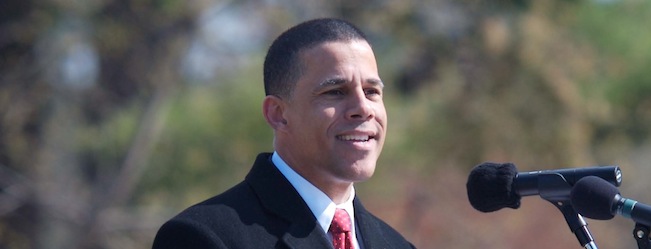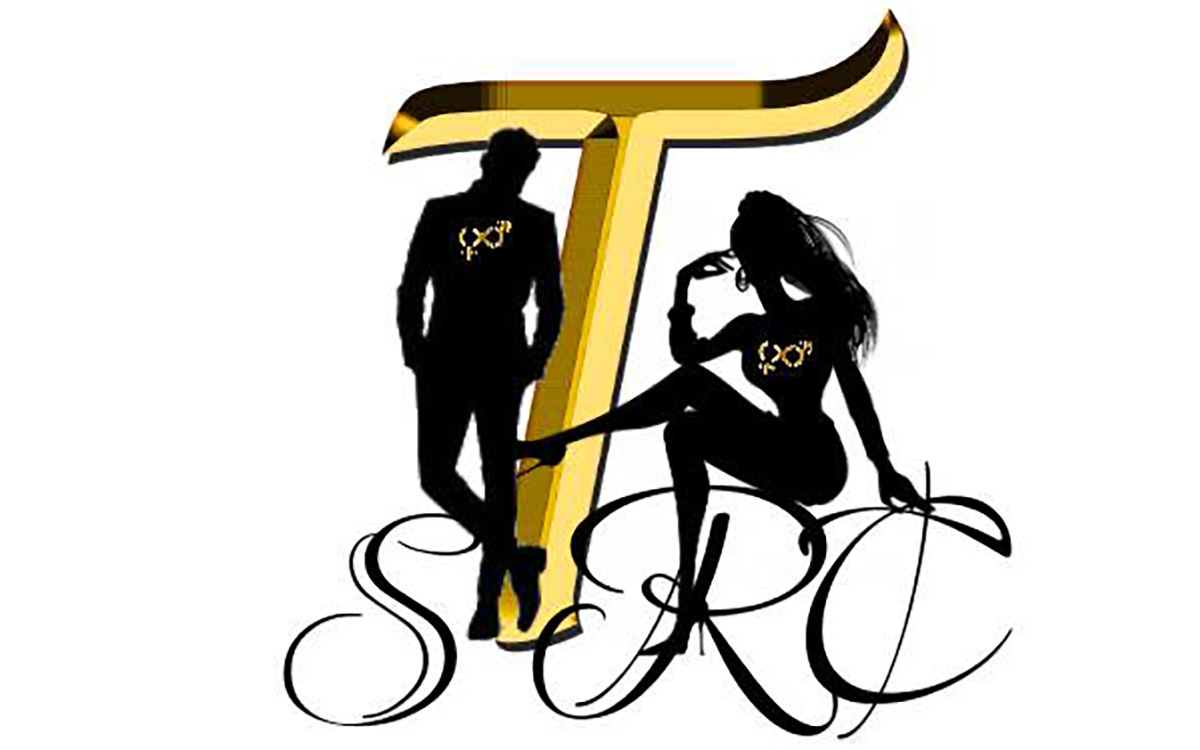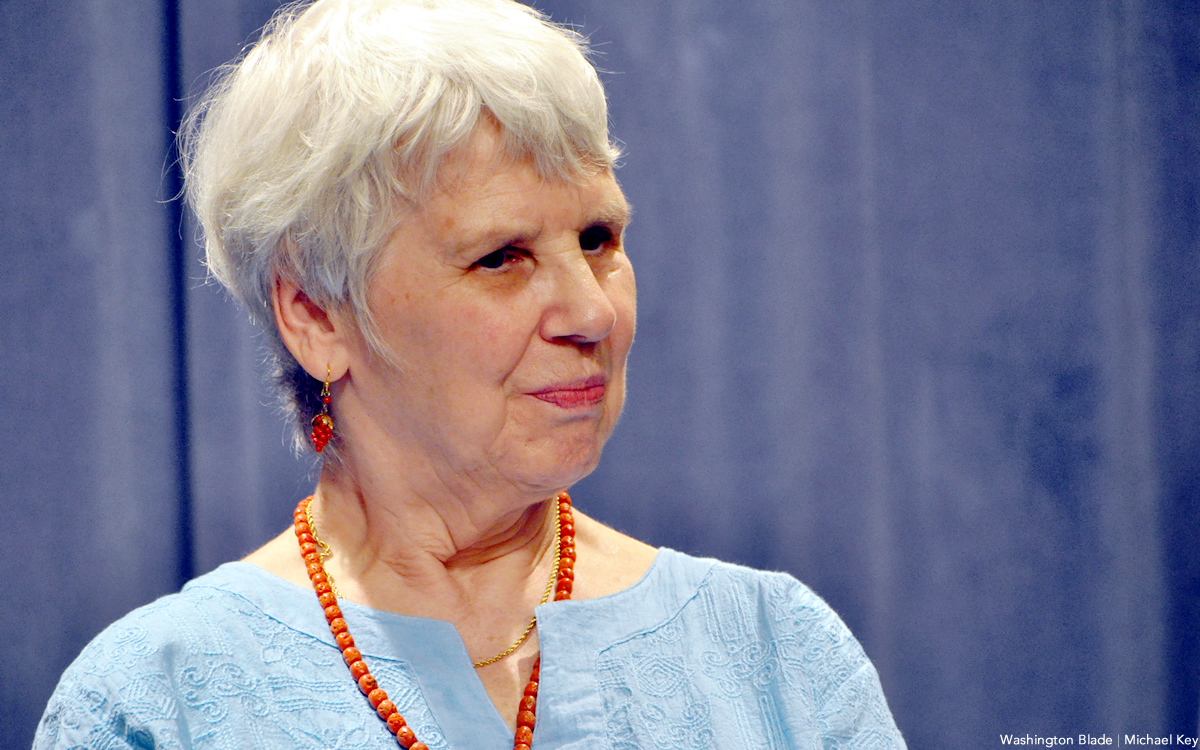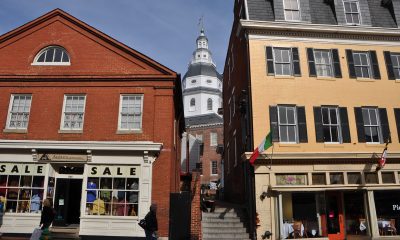Local
Md. lieutenant guv backs marriage bill
Anthony Brown believes bill would survive voter referendum

In his first public remarks on same-sex marriage, Maryland Lt. Gov. Anthony Brown told the Washington Blade Wednesday that he supports marriage equality for lesbians and gays and favors the approval of a same-sex marriage bill pending in the Maryland Legislature.
LGBT activists believe Brown, a Prince George’s County Democrat who is considered a potential candidate for governor in 2014, could play a key role in defending the marriage bill against a voter referendum in 2012 if the legislature passes it this year, as most political observers expect.
“I have always believed that all Marylanders should have an equality of rights and responsibilities and that includes marriage equality,” he said in an exclusive interview.
“So regardless of gender, we should be able to choose who it is that we are going to marry and hopefully spend the rest of our lives with. And so I’m supportive of that,” he said.
Brown said he has friends and acquaintances who are in same-sex relationships and he has seen first-hand how they are “successfully raising children,” a development that has helped shape his views on the marriage issue.
Brown’s expression of support for the marriage bill came on the same day that Republican State Sen. Allan Kittleman announced he was dropping plans to introduce a civil unions bill and would vote instead for the marriage bill.
Some LGBT activists viewed a civil unions bill as a possible competing measure that might have derailed the marriage bill.
The decision by Kittleman, the former Senate minority leader, to abandon plans to introduce a civil unions bill and to back the marriage measure, and Brown’s firm statement backing same-sex marriage, are likely to be viewed by LGBT activists as a major boost for the marriage measure.
Up until now, Brown had not taken a public stand on the marriage bill, although his press secretary, Mike Raia, said Brown had informed colleagues and friends of his support for the measure.
“The lieutenant governor’s statement comes as a surprise, but certainly a welcome surprise,” said Lisa Polyak, a board member and spokesperson for Equality Maryland, the statewide LGBT group leading efforts to pass the bill.
“We’re grateful for all elected officials, especially those in leadership roles, who understand that our families seek equal treatment under the law,” she said. “And we welcome the lieutenant governor’s joining the coalition to achieve civil marriage for same-sex couples.”
Gov. Martin O’Malley has said he would sign a same-sex marriage measure approved by the legislature. And most political observers in the state say supporters of the bill have the votes to get it through the legislature.
Before being named by O’Malley as his running mate in the 2006 gubernatorial race, Brown had served two terms in the Maryland House of Delegates from P.G. County. During his second term, Brown was named the House of Delegates’ majority whip, a leadership post that enabled him to build a good working relationship with his fellow lawmakers.
Noting that his job as whip involved “counting heads” to determine the support of various bills, Brown said he believes the marriage measure has solid support in the House of Delegates and appears to enjoy a “slim majority” in the Senate.
Asked what he thinks the chances are for opponents to place the marriage bill before the voters in a referendum, Brown said he believes a referendum on the issue will make it to the ballot, but he thinks voters will uphold the law rather than overturn it.
“It’s not a high hurdle in Maryland to get an issue on the ballot,” he said. “So it would be on the ballot for 2012 during the presidential campaign. There’s going to be a lot of voter turnout as we typically see in presidential campaigns. No doubt, like other referenda, it’s going to be hotly contested and debated.”
Brown added, “As I said today, my position is in support [of the marriage bill]. As we approach 2012 I’ll certainly evaluate what role I’m going to play on that issue.”
As a prominent black elected official, LGBT advocates for the marriage bill would likely seek Brown’s help in campaigning for the bill in a referendum fight in his home turf of majority black P.G. County. In California in 2008, exit polls showed that a majority of black voters supported overturning that state’s same-sex marriage law in the bitterly fought ballot measure known as Proposition 8.
“I think Prince George’s County, which is predominantly African American, should not be viewed as a monolithic entity or county or community,” Brown said. “I think we’re going to get varying degrees of support and varying degrees of opposition. We know from public comments that many of the traditional civil rights organizations have come out in support of it,” he said, referring to the same-sex marriage bill.
“We also know that a number of members of the clergy from the African-American churches have come out or spoke against it,” he said. “So there’s not a clear or I should say single voice in Prince George’s County on this issue as I suspect is true in most all of the large counties in Maryland.”
Brown was asked what he thought of assertions by Bishop Harry Jackson, a Maryland minister who led efforts to oppose D.C.’s same-sex marriage law. Jackson and his supporters, among other things, argued that same-sex unions endanger black families because they undermine traditional marriage.
“Well, my only response, and this is not a response to the impact on black families, white families, or any other families,” he said. “My response to that is I have had experience through friendships and acquaintances with couples – same-sex couples – who are successfully raising children. And that’s in a number or variety of racial or ethnic backgrounds. So I have difficulty understanding that comment.”
Brown’s official biography on the Maryland State website shows that he has served in the Army since 1984 both on active duty and currently in the reserves. He served a 10-month tour in Iraq as part of a Multi-National Force in 2004 that provided humanitarian assistance to the Iraqi people. In 2007 he was promoted to the rank of colonel and, as an attorney with a degree from Harvard Law School, he currently commands a Pennsylvania-based Army Legal Support unit.
With that as a backdrop, Brown was asked what he thought of the successful effort to repeal “Don’t Ask, Don’t Tell,” the law that barred gays and lesbians from serving openly in the military.
“Well, first I’ll say I couldn’t be more proud of our president for moving forward on the elimination of the “Don’t Ask, Don’t Tell” policy and recognizing full membership, if you will, in uniform services of men and women regardless of who they choose to be in a relationship with,” he said. “So I’m proud of that and I think it’s a big step forward for the armed forces and it’s a big step forward for our country.”
Added Brown, “And I will also say that after 26 years of active and reserve duty, I’d be kidding people if I told them that I never encountered a soldier who didn’t tell me that they were gay. And yet I have observed these soldiers performing their duty patriotically with the same level of diligence and commitment and that their preference had no relevance to their performance of their military duties.”
When asked about a transgender non-discrimination bill that was introduced last week into the House of Delegates with 55 co-sponsors, Brown didn’t disclose whether he has a position on the measure.
“I’m not familiar with that one,” he said. “I know I’ve dealt with some transgender bills when I was on the House Judiciary Committee, but this one in particular I’m not familiar with.”
Virginia
Norfolk transgender resource center vandalized
Anti-trans graffiti spraypainted onto Southeastern Transgender Resource Center’s windows

The Norfolk Police Department is investigating the vandalism of a transgender resource center’s building.
Tarena Williams, founder of the Southeastern Transgender Resource Center, told WAVY that someone spraypainted anti-trans graffiti on the windows of her organization’s offices on Sunday or Monday morning. Williams told the Hampton Roads television station that seeing the messages was like “walking into hell.”
“I opened up STRC, even the Lamina House,” she told WAVY. “I opened up that to get away from those types of words. This is a place you can come to get away from that, but to see that sprayed over the window. It’s kind of like you are walking into hell. … To be honest, I was like in shock.”
Authorities are investigating the vandalism.
West Virginia
Appeals court strikes down W.Va. transgender athlete ban
Ruling finds law violates students’ constitutional rights, Title IX

BY LORI KERSEY | The 4th U.S. Circuit Court of Appeals has struck down West Virginia’s ban on transgender athletes, finding the law violates trans students’ rights under the Equal Protection Clause of the constitution and Title IX, a federal civil rights law prohibiting discrimination based on sex in education programs.
The case, B.P.J. vs. the West Virginia Board of Education, was filed in May 2021 on behalf of Becky Pepper-Jackson, a 13-year-old trans middle school student and track athlete who would be barred from participating if the ban is upheld. Pepper-Jackson is represented by the American Civil Liberties Union, the American Civil Liberties Union of West Virginia and Lambda Legal.
In April 2021, West Virginia Gov. Jim Justice signed into law a bill prohibiting trans women and girls in the state from participating in sports that align with their gender identity. The U.S. Court of Appeals in February 2023 blocked the state from removing Pepper-Jackson from her school’s track and field team as legal advocates appealed a lower court’s ruling upholding the ban.
In Tuesday’s ruling, Judge Toby Heytens wrote that offering Pepper-Jackson the “choice” between not participating in sports and participating only on boys teams is not a real choice.
“The defendants cannot expect that B.P.J. will countermand her social transition, her medical treatment, and all the work she has done with her schools, teachers and coaches for nearly half her life by introducing herself to teammates, coaches and even opponents as a boy,” the judge wrote.
“By participating on boys teams, B.P.J. would be sharing the field with boys who are larger, stronger, and faster than her because of the elevated levels of circulating testosterone she lacks,” he wrote. “The Act thus exposes B.P.J. to the very harms Title IX is meant to prevent by effectively ‘exclud[ing]’ her from ‘participation in’ all non-coed sports entirely.”
In a statement Tuesday, Joshua Block, senior staff attorney for the ACLU’s LGBTQ and HIV Project, called the court’s ruling “a tremendous victory for our client, transgender West Virginians and the freedom of all youth to play as who they are.”
“It also continues a string of federal courts ruling against bans on the participation of transgender athletes and in favor of their equal participation as the gender they know themselves to be,” Block wrote. “This case is fundamentally about the equality of transgender youth in our schools and our communities and we’re thankful the 4th Circuit agreed.”
“We hope today’s ruling sends a message of hope to the trans youth of West Virginia,” Aubrey Sparks, legal director of the ACLU of West Virginia, said in the statement. “And a message of warning to politicians who continue to dehumanize this vulnerable population.”
West Virginia is one of 21 states that have banned trans student-athletes over the last three years, according to the ACLU.
In a statement Tuesday, West Virginia Attorney General Patrick Morrisey vowed to defend the ban and said he is “deeply disappointed” in the decision.
“The Save Women’s Sports Act is ‘constitutionally permissible’ and the law complies with Title IX,” Morrisey said. “I will keep fighting to safeguard Title IX. We must keep working to protect women’s sports so that women’s safety is secured and girls have a truly fair playing field. We know the law is correct and will use every available tool to defend it.”
******************************************************************************************

Lori Kersey is a reporter with a decade of experience reporting in West Virginia. She covers state government for West Virginia Watch.
******************************************************************************************
The preceding article was previously published by the West Virginia Watch and is republished with permission.
Nonprofit, nonpartisan, independent journalism not hidden behind a paywall. Mountaineers are always free, and so is West Virginia Watch.
West Virginia Watch is part of States Newsroom, the nation’s largest state-focused nonprofit news organization.
District of Columbia
Reenactment of first gay rights picket at White House set for April 17
Event marks 59th anniversary of historic push for gay rights in nation’s capital

D.C.’s Rainbow History Project announced it will hold a reenactment on Wednesday, April 17, of the historic first protest for gay rights in the form of a picket line in front of the White House that took place on that same day in 1965.
In a statement released last week, Rainbow History Project says the reenactment will mark the 59th anniversary of an event that is credited with bringing attention for the first time to the federal government’s longstanding discrimination against a minority group referred to then as homosexuals or gays and lesbians.
The statement notes that the 1965 event was organized by the Mattachine Society of Washington, D.C., the first politically active LGBT organization in the nation’s capital founded by local gay rights pioneer Frank Kameny.
“The picket took place on the White House sidewalk, Lafayette Park, 1600 Pennsylvania Ave., on April 17, 1965,” the statement says. “For exactly one hour, from 4:20 p.m. to 5:20 p.m., members of the Mattachine Society of Washington walked in a circle, non-stop, in silence, carrying posters of their demands,” the statement continues.
“The White House picket is the origin story for public demonstrations for gay rights in the U.S., and the origin story for Pride Marches and the annual LGBTQ Pride celebrations which occur across the globe,” according to the statement.
It says those picketing in the April 1965 event, which included Kameny and longtime local D.C.-area lesbian activist Lilli Vincenz, both of whom held doctorate degrees, called on the government to adopt the Mattachine Society of Washington’s four major demands: an end to the exclusion of homosexuals from federal government employment; an end to the ban on gays and lesbians from serving in the U.S. military; an end to the “blanket denial” of security clearances for gay people; and an end to the “government refusal to meet with the LGBTQ community.’
Among those who chose not to respond to the request for a meeting was President Lyndon B. Johnson, who occupied the White House at the time of the 1965 picketing.
Vincent Slatt, the Rainbow History Project’s director of archiving and one of the lead organizers of the April 17 reenactment event, said the event is aimed, among other things, at drawing attention to how far the LGBTQ community has come since 1965. He said the event is not in any way a protest of the administration of President Joe Biden and Vice President Kamala Harris, who Slatt called staunch supporters of the LGBTQ community.
“We are just reenacting this historical event and pointing out how far we’ve come,” Slatt told the Washington Blade. “If you think about what it means in 1965 when these people were protesting and LBJ would not even respond to them. And now, we are at a place where Vice President Harris speaks on a stage at Capital Pride.”
The Rainbow History Project statement notes that the reenactment event will also be held in honor of Kameny, who died in 2011, and Vincenz, who passed away in 2023, both of whom participated in a similar reenactment event in 2008.
Among those who will be participating in this week’s reenactment on April 17 will be longtime local LGBTQ rights activist Paul Kuntzler, who is the only known surviving person who was among the White House picketers at the April 1965 event. Kuntzler will be carrying a replica of his own picket sign he held at the 1965 event, the statement says.
It says Rainbow History Project volunteers will also carry replicas of the original protest signs and hand out literature explaining the picket to passersby and tourists.
Similar to the 1965 event, the reenactment picketing at the White House will begin on April 17 at about 4:15 p.m., according to Slatt of the Rainbow History Project.





















